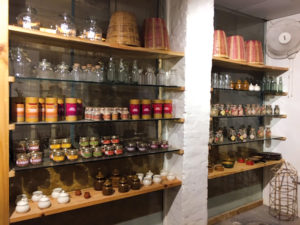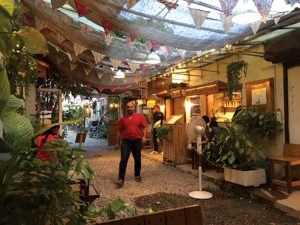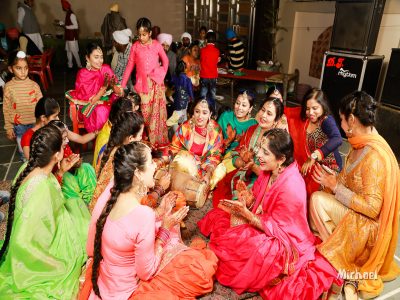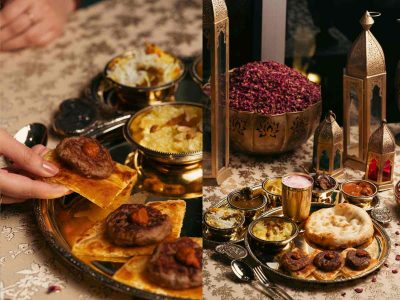Jugmug is a place where people from all walks of life can come and converse over a cup of tea without being conscious of who they are or what they are wearing, rich or poor
A lot can happen over a cup of tea. A lot happens in this country over a cup of tea not just the Prime Minister Narendra Modi, politicians from various political parties hyperventilate during chai pe charcha. In dusty lanes and bylanes of India, or on the highways, under the tree, or on a thela (cart), or by a paan or barber shop, chai is available in every nook and cranny of northern India. People comfortable in their skin assemble and meet, read newspapers over a cup of chai. It’s a communal activity that binds people.
Jiten Suchede, a graphic designer by training, founded Jugmug Thela (literally ‘glistening cart’) that would offer the best tea to people at large, rich and poor, with quality cookies, condiments and snacks. Bottled herbs and spices are on offer. Contrary to the impression a visitor may get, Jugmug is an antithesis of gentrification — a process of making a place or activity refined enough to exclude many.
This is not part of the cafe culture, that demands a certain attire, attitude and exclusionist rates. A person from the lower middle class may like to be in a cafe, Jiten feels, for experiential sake, pay through the nose to enjoy a cup of coffee. But being constantly observed as the odd one out, he would never feel part of the social arrangement. After having coffee, he’d want to get out fast and gasp some fresh air.
Please don’t get him wrong, his love of chai is not based on the dislike for coffee — Jugmug offers the best of coffees in the town. He wanted to create a place where people from all strata of society could come and enjoy a cup of chai without being self-conscious, where they can speak their mind without inhibition. “A place where they won’t be judged,” Jiten puts its succinctly.

Jugmug Thela — as the name suggests was a cart — that would be set up at select places and times of the year. People loved chai and the concept. The registered office was in Saidulajab, where a dozen godowns, long rectangular halls, with uneven floor, contorted walls and asbestos ceiling, are lined up along a lane. One of the godowns was converted by Jiten into his office some seven years ago.
Many a times, people would find him on the internet, and land up at Jiten’s office, demanding a cup of tea, which he would make for them himself. When such random visitors in search of a good cup of tea became rather frequent, it was decided he might as well open a chai shop.
This is how it started. Slowly but surely, the place started to transform. Built in a piecemeal manner, bit by bit, on the working principle of ‘jugaad’, making the best use of what’s available — like the furniture crafted out of wooden packaging particle boards. The making of Jagmag is a very organic process. Now it serves a host of purposes, offering coffee, food and also a venue for book releases and art shows.
In the last few years, the godowns have transformed into cafes, restaurants and arts venues, and the lane is now called Champa Gali has become a tourist attraction. Some compare it Parisian cafes or streetside eateries in Italy. Jiten is not comfortable with that description. Imtiaz Ali recently shot his latest movie, no doubt the place has acquired a cult value, and has transformed the whole locality of Saidulajab, which not long ago was a sleepy urban village in Delhi’s Lal Dora into a venue where people come, enjoy a cup of tea, and exist the way they are.
Again, it’s not another manifestation of the cafe culture that’s gaining currency in the city. It’s based on a the chaupal model, where people in a village assemble under a shady tree, and indulge in gossip over a cup of tea. Being a designer, Jiten knows emotional state depends on the aesthetics of the place — it’s inviting and comforting. Many college goers come, click selfies and leave without eating anything. Perhaps the selfies are meant for the social networking sites, it’s almost aspirational to be seen hanging out here. Even pets are welcome: There’s an inhouse cat that likes to walk over tables lined along the Champa Gali, her stiff tale pointing skyward.

What makes Jiten proud is the variety of people who come and spend time here, from south Delhi aunties, to the richie rich from neighbouring Sainik Farms, mostly students, also expats — particularly Japenese. There are some who travel for hours, from adjoining districts, to spend some quality time here.
Happily unmarried, Jiten lives with his mother in Saket, not very far from here. He promised himself that “he will never manage this place”, it has to be a self-sustaining enterprise. There are 25 employees, mostly from less privileged backgrounds, some having grown up in an orphanage. They are no hierarchies, people have tasks to perform, and responsibility is the guiding and motivating force. Jiten is mostly in his office, housed in the neighbouring godown, which also doubles as a workshop and a space used to host events like book launches and art exhibitions.
There are books lined up neatly on shelves mounted on the wall. These are the books donated by people who admire Jugmug. Loners are welcome to flip through the pages over a cup of tea. They can also buy the book for half the marked price, and the money so collected is donated to orphanages, old age home and such institutions. People are welcome to donate more books.
How has Jugmug changed him? Jiten ponders for a while and says, “I seek engagement at a deeper level. The rough edges have smoothened over time.”
At some level, not much has changed. Jiten still goes to his favourite chai shop, nestled in the shade of kikar trees, to drink chai made by Tanku. Jiten describes him as “institution.” Many of the visitors being expats, he can utter words in French and Spanish. The name ‘Jugmug’ is inspired by this place: at night, jugnu (fireflies) hover around the kikar tree.





